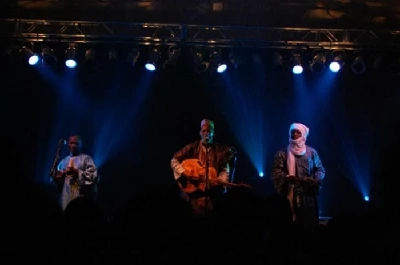Sidi Toure
-
Cafe OTO, London, 13/11/2012
published: 6 /
12 /
2012

Sarah Mwangi is increasingly impressed by Mali musician Sidi Toure at a gig at the Café OTO in London on his first European tour
Article
“My voice and my guitar” were among the few English words Sidi Touré spoke on his first tour in the UK. He repeated these words at intervals throughout the night, as a reminder to the non-French speakers that the passion in his voice was just as important as the words.
And true to his words, the nuances of emotion translated well across the Café OTO audience. So much so, that even with a mild knowledge of Mali’s current turmoil, through his rich and sincere tones, you were able to understand his personal distress with the current state of his homeland’s affairs. His sorrow, his hope, strength and joy were all eloquently conveyed in the stories he told.
It was hypnotic. Sidi had a commanding yet warm presence which had all eyes fixed on him as he stood at centre stage, shining in his golden Malian attire.
But just like hypnosis, if you’re doubtful, the hypnosis doesn’t hold. So, there I was, at the sidelines like a tourist, watching as Sidi and his men played their melodious evocations to an audience half full of School of Oriental and African Studies students. The performance was enchanting, for sure, but every so often slight peeves broke the spell and questioned its authenticity. The first issue was a mountain-out-of-a-mole-hill moment; an easy one to overlook. The four men on stage stood elegantly in their beautiful traditional African dress… except for the Chuck Taylors peeking from the hem of their garments. Well, Converses can alter the appearance and purpose of wearing traditional cloth, but it’s not a spell breaker.
The second issue, however, played a significant part in altering the performance. The quartet was made up of two musicians with traditional West African instruments, the n’goni and the calabas, while Sidi and the remaining band mate played recognised Western instruments, acoustic guitars. African versus Western; which would prevail?
At its best, the n’goni was able to distinguish itself from the similar guitar sounds to produce quick, piercing melodies with the rhythmic patter of percussion as its companion. When the guitars were at their harmonious climax, the African instruments appeared, however, to be an afterthought. What should have been the prominent feature of the night became muted over the stronger acoustic guitar presence and were relegated to filling in the gaps.
Even as that critique was being formed, Sidi’s phrase echoed once more through the room, ‘My voice and my guitar’. Now serving as a reminder of the unification of the two different styles; his Songhai blues accompanied by Western sounds.
But what is the result of this unity? The performance sounded polished. As though, a once raw and intuitive musician (whose main instrument is the guitar), had been cleaned up a little so that his appeal could spread a bit wider. That’s not necessarily a bad thing, as proven by the sold out Café OTO. It just means that expectations should be adjusted slightly. So, instead of expecting to be transported to the Songhai Empire by the gentle strum of the n’goni, I should have been enjoyed remaining in the intimate café in Dalston and listening to the acoustic stylings of this revered musician, with subtle hints to an African culture.
At times, resistance is restrictive. And by the end of the night I had succumbed. Not like the hypnotised, but among them; happily entertained and sipping on wild green tea.
Picture Gallery:-

